【备战2014,教师原创】2014年高考英语语法备考 形容词和副词 课件
文档属性
| 名称 | 【备战2014,教师原创】2014年高考英语语法备考 形容词和副词 课件 | 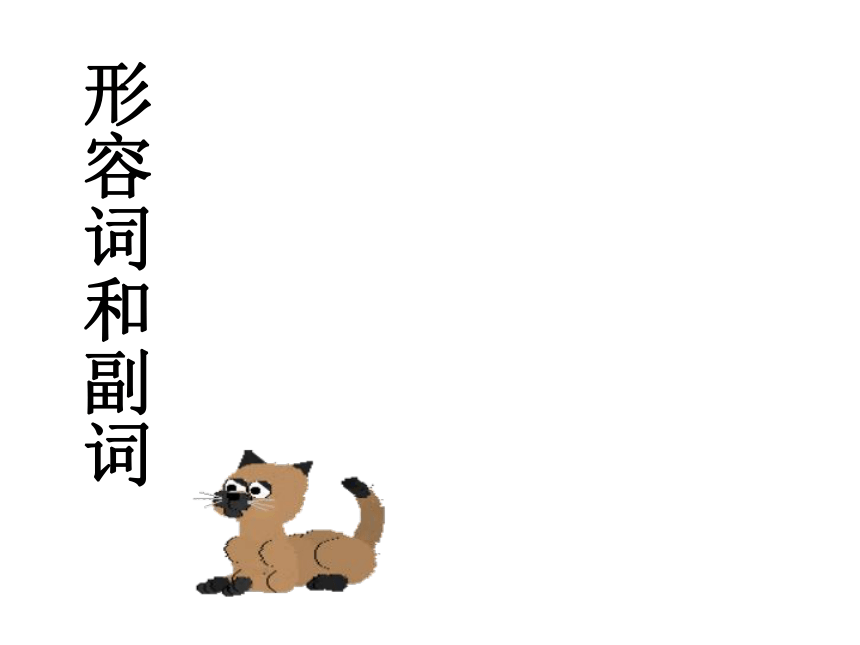 | |
| 格式 | zip | ||
| 文件大小 | 2.0MB | ||
| 资源类型 | 教案 | ||
| 版本资源 | |||
| 科目 | 英语 | ||
| 更新时间 | 2014-03-24 19:31:35 | ||
图片预览

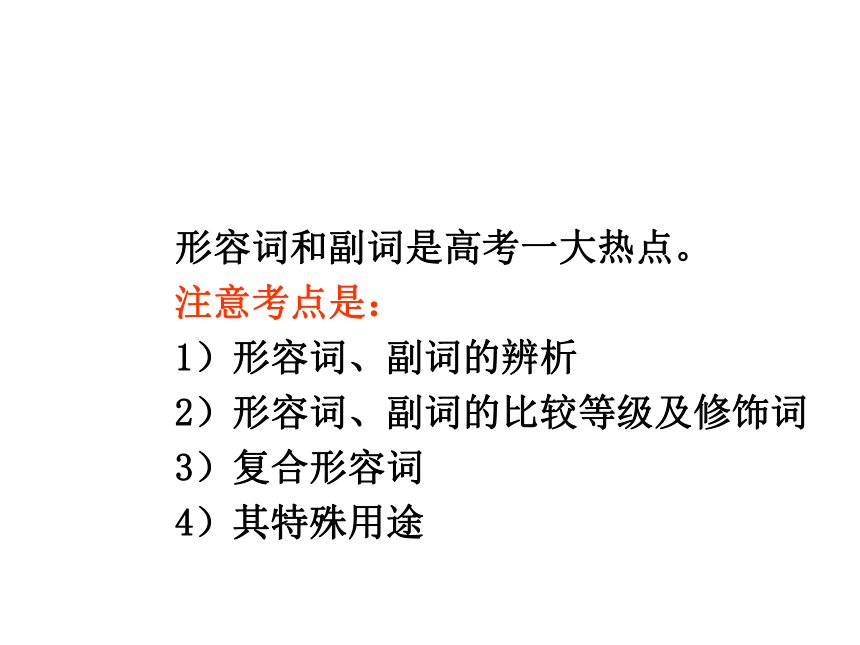
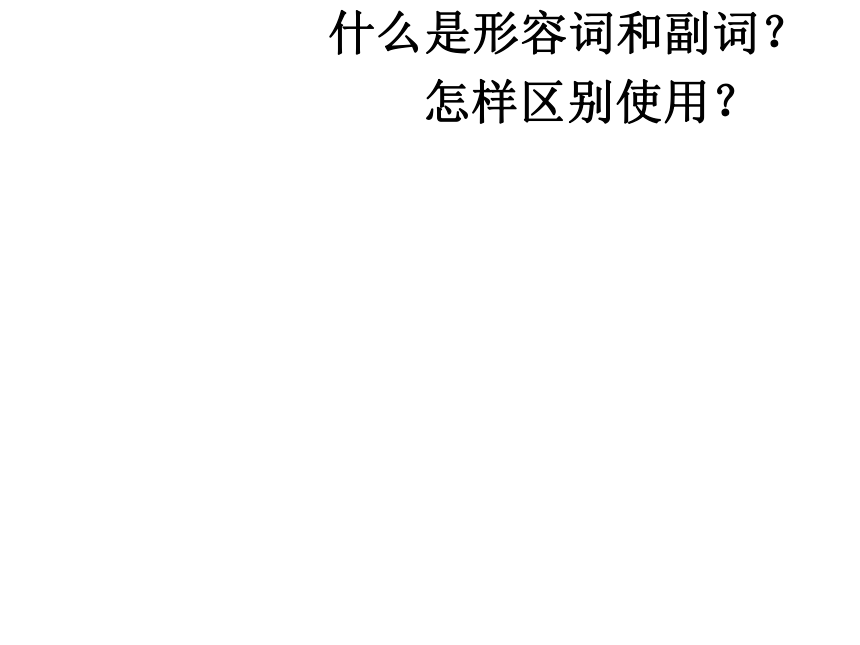
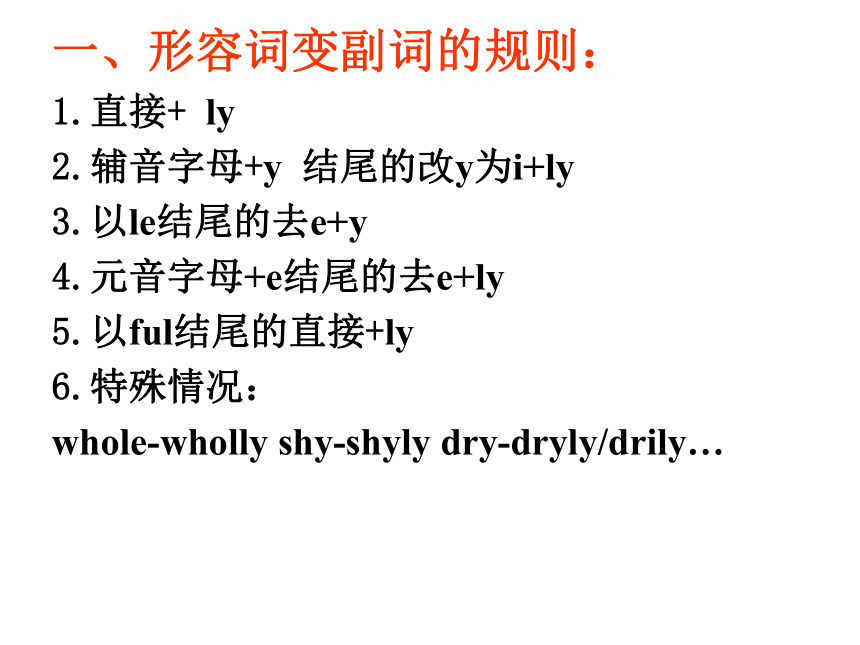
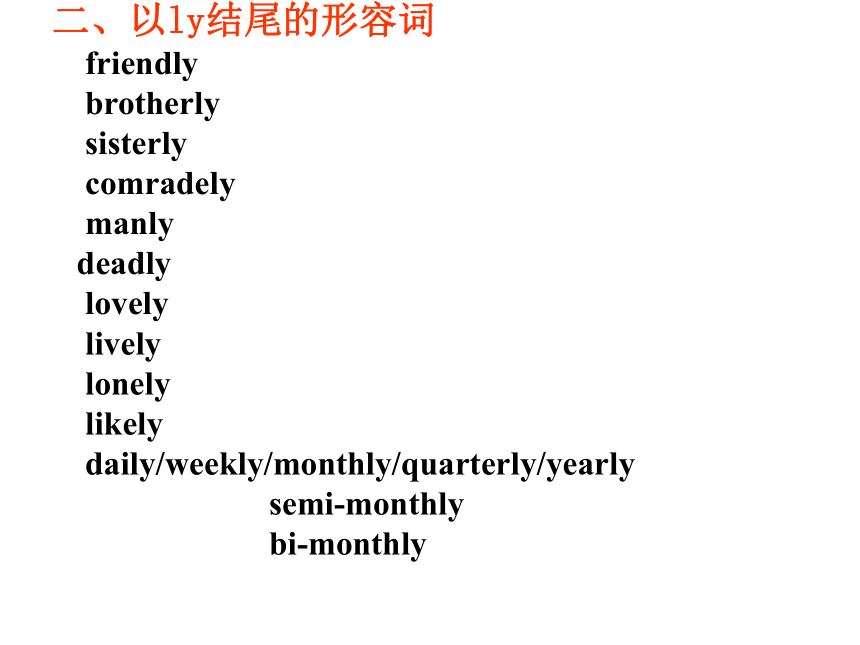

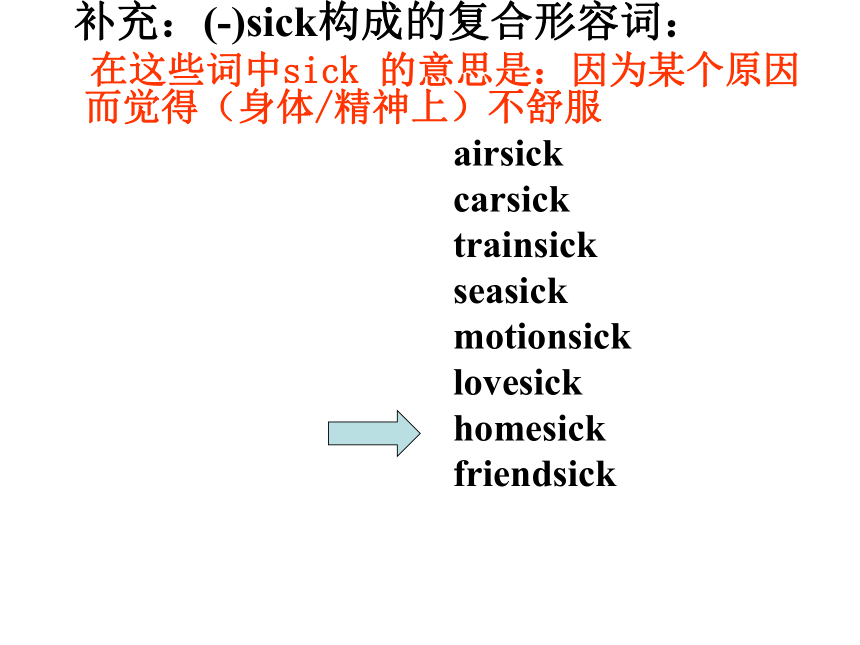
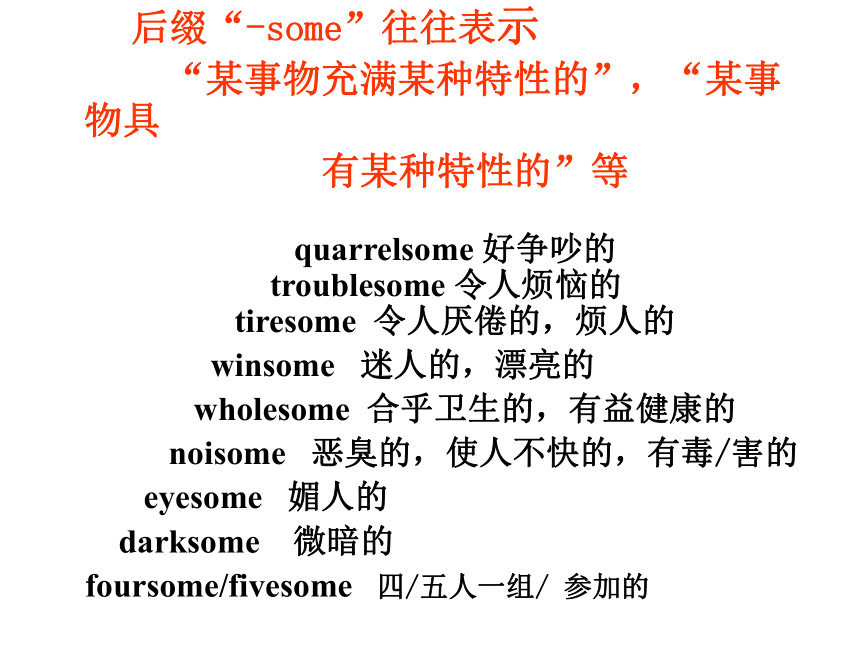
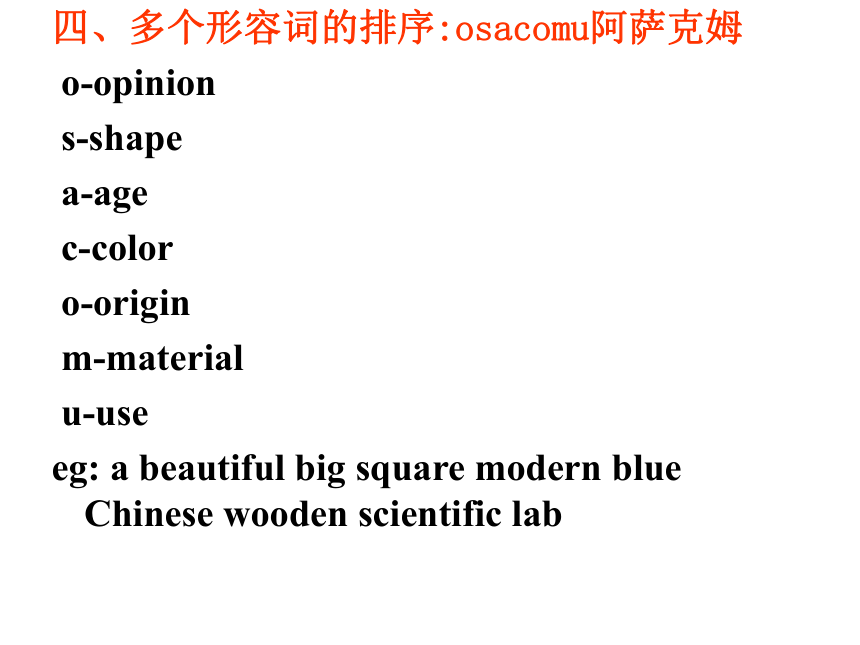
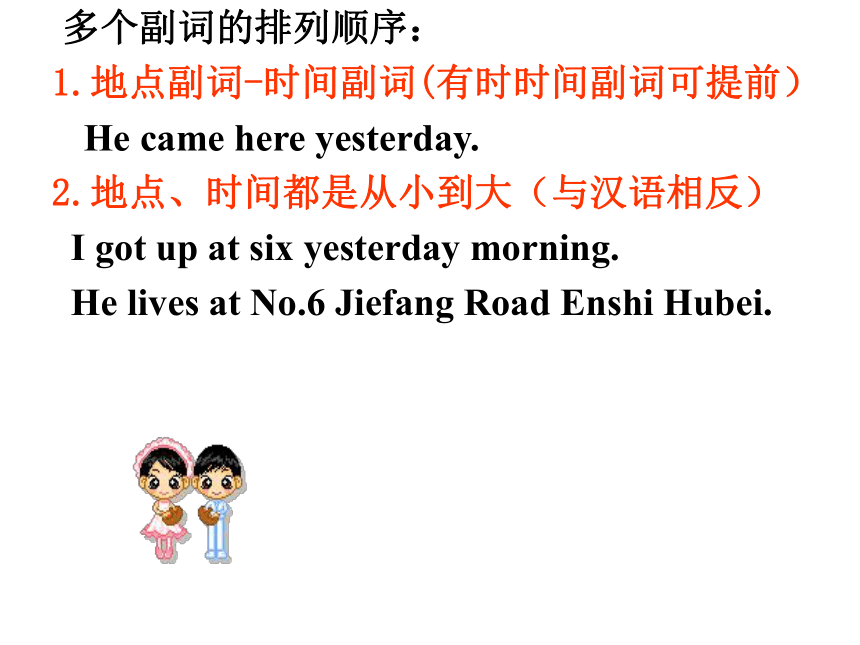
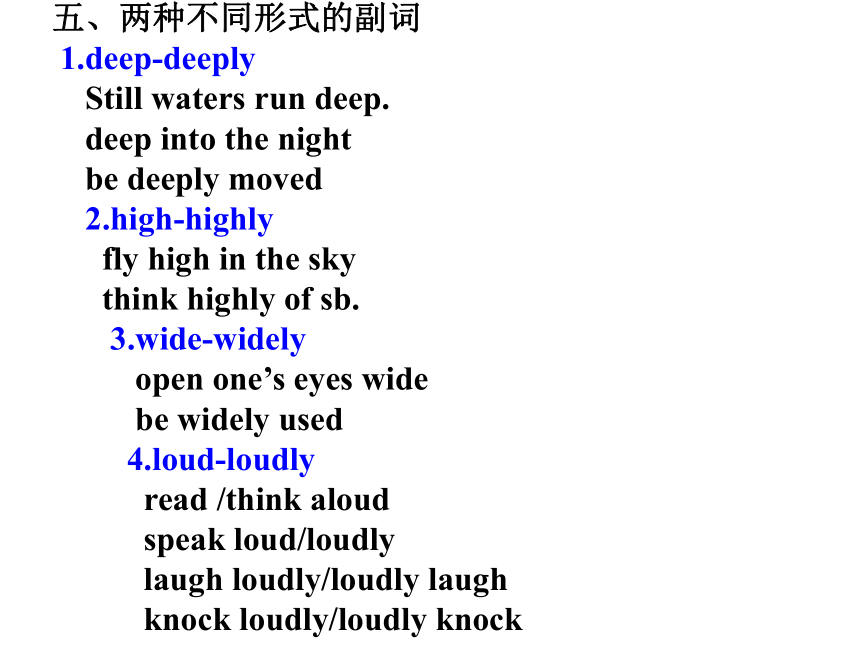
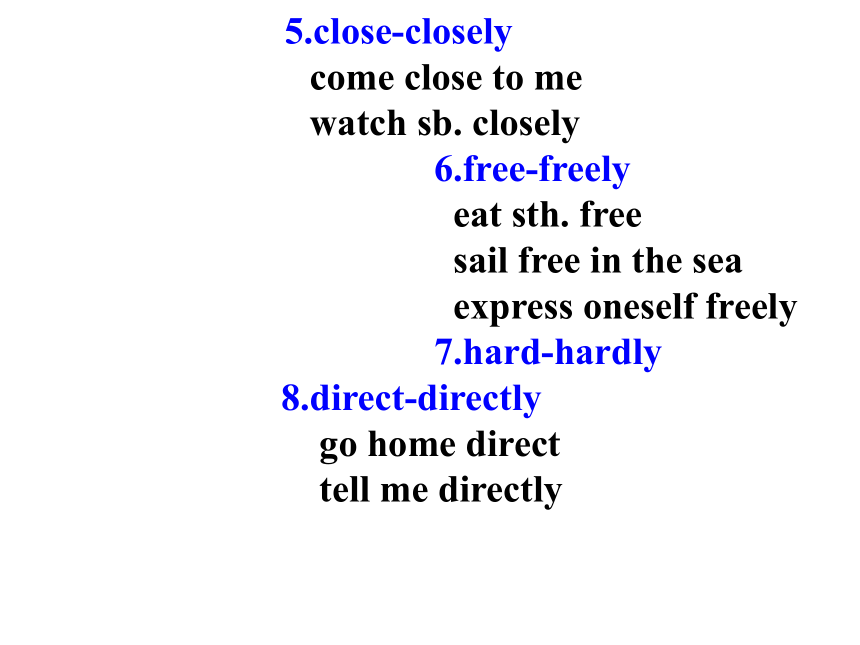
文档简介
课件44张PPT。形容词和副词
形容词和副词是高考一大热点。
注意考点是:
1)形容词、副词的辨析
2)形容词、副词的比较等级及修饰词
3)复合形容词
4)其特殊用途 什么是形容词和副词?
怎样区别使用?一、形容词变副词的规则:
1.直接+ ly
2.辅音字母+y 结尾的改y为i+ly
3.以le结尾的去e+y
4.元音字母+e结尾的去e+ly
5.以ful结尾的直接+ly
6.特殊情况:
whole-wholly shy-shyly dry-dryly/drily…二、以ly结尾的形容词
friendly
brotherly
sisterly
comradely
manly
deadly
lovely
lively
lonely
likely
daily/weekly/monthly/quarterly/yearly
semi-monthly
bi-monthly
三、常见复合形容词的构成形式:
1.形容词+doing ordinary-looking
2.数词+名词 100-word
3.数词+名词 –ed three-legged
4.数词+名词 +adj. three-year-old
5.adj.+名词-ed short-sighted
6.名词+doing English-speaking
7.名词+done man-made
8.adv.+doing fast-moving
9.adv.+done newly-built
10.其它的:
face-to-face know-it-all good-for-nothing
out-of-date down-to-earth … 补充:(-)sick构成的复合形容词:
在这些词中sick 的意思是:因为某个原因 而觉得(身体/精神上)不舒服
airsick
carsick
trainsick
seasick
motionsick
lovesick
homesick
friendsick
后缀“-some”往往表示
“某事物充满某种特性的”,“某事物具
有某种特性的”等
quarrelsome 好争吵的 troublesome 令人烦恼的 tiresome 令人厌倦的,烦人的
winsome 迷人的,漂亮的
wholesome 合乎卫生的,有益健康的
noisome 恶臭的,使人不快的,有毒/害的
eyesome 媚人的
darksome 微暗的
foursome/fivesome 四/五人一组/ 参加的四、多个形容词的排序:osacomu阿萨克姆
o-opinion
s-shape
a-age
c-color
o-origin
m-material
u-use
eg: a beautiful big square modern blue Chinese wooden scientific lab 多个副词的排列顺序:
1.地点副词-时间副词(有时时间副词可提前)
He came here yesterday.
2.地点、时间都是从小到大(与汉语相反)
I got up at six yesterday morning.
He lives at No.6 Jiefang Road Enshi Hubei.五、两种不同形式的副词
1.deep-deeply
Still waters run deep.
deep into the night
be deeply moved
2.high-highly
fly high in the sky
think highly of sb.
3.wide-widely
open one’s eyes wide
be widely used
4.loud-loudly
read /think aloud
speak loud/loudly
laugh loudly/loudly laugh
knock loudly/loudly knock
.
.
.
5.close-closely
come close to me
watch sb. closely
6.free-freely
eat sth. free
sail free in the sea
express oneself freely
7.hard-hardly
8.direct-directly
go home direct
tell me directly
9.near(在附近)-nearly
a near escape=a narrow escape
go/come near doing 几乎,差一点儿
10.late-lately-later-latest-latter
11.slow-slowly
slow多用在how,go, come ,jump,walk,run 等动词后
固定词组和谚语中的副词:
1.take it easy
2.aim high力争上游
3.far and wide 四面八方
4.safe and sound 平安无恙
…
六,last
1.动词(持续/维持/够用/持久)
The food can last two weeks.
The coat lasts well.
2.形容词(最后的)
主要考点:最后的人/东西+to do
He is often the last to leave the classroom.
3.形容词(最不可能的,最不适合的,最不期望的)
He is the last to help me,I think.
I am the last person that will refuse you.
The last thing I want to do is to offend you.
He is the last man I want to see.
4. last/next/this/that+时间名词作状语,前面不需要任何介词
七、enough
1.名词(代替可数与不可数)
Can you lend me some money?I haven’t enough.
You can take these books.I still have enough.
2.形容词(修饰词前后均可)
He has given me enough apples/apples enough.
3.副词(只能放在被修饰词之后)
The ruler is long enough.
You can run fast enough.
4.can not/can never与enough/over/too连用(越……越好,无论怎样……也不为过)
You are not careful enough.
You cannot be careful enough.八,一些名词、形容词前特殊的修饰语
tall/big talk(吹牛,大话)
red-hot achievement(最新成就)
glad news(好消息)/heavy news(坏消息)
be well worth doing
be well content with
quite possible/impossible
be sound/fast asleep
be wide awake
dead drunken(烂醉)
dead end(棘手的,无出路的)
regular foods/usual foods/ordinary foods
regular customer
strong tea
short weight/supply
a dead well
live wire(通电的电线,生龙活虎的人)
live coal
live eyes(炯炯有神的眼睛)
a live issue(尚在讨论中的问题)
live ideas(新思想)
live colors(鲜艳的颜色)
a live teacher(精力旺盛的老师)
a live gun(真枪)
dry goods(纺织品)
sweet water
confidence man(骗子)
horse sense(常识)
capital idea(好主意)
capital letter
black tea
black stranger(完全陌生的人)
white man(忠实可靠的人)
white coffee black coffee
green hand
blue stocking(女学者,女才子)
English disease(气管炎)
angry wave
cloudy water
heavy traffic
heavy harvest
heavy pollution
be heavily polluted
heavy smoker
heavy rain
heavy weather
heavy drinker
heavy face
heavy heart
heavy debts
还有一类形容词:
1.clean(干净的)---cleanly(有干净习惯的)
2.classic(一流的)---classical(古典的)
3.healthy(健康的)---healthful(有益于健康的)
4.likely(可能的)---likable(可爱的)
5.childish(幼稚的)---childlike(孩子般的)
6.notable著名的(指事)---noted(指人)
7.social(社会的)---sociable(善社交的)
8.fatal(致命的)---fateful(决定性的)
9.effective(有效的)---efficient(有效率的)
10.economic(经济的)---economical(节俭的)
11.electric用/带/有电的---electrical与电有关的
12.industrial(工业的)---industrious(勤奋的)九,形容词、副词的比较等级
两者之间进行比较用比较级,三者或者三者以上进行比较用最高级。
1.比较级和最高级的构成规则:单音节和双音节词一般都在后面+-er/-est,多音节词在其前面+more/most.形容词最高级前面必须加the,副词前面的the可要可不要。但是:
单音节、双音节词在作表语时,在现代英语中,也可以在其前面+more/most.
eg. He is taller than me.(√)
He is more tall than me.(√)
The taller boy is my friend.(√)
The more tall boy is my friend.(×)
Who is taller, Tom or Jack?
Who is the tallest, Tom ,Jack or John?2.降级比较在其前面+less/least
He is shorter than me.=He is less tall than me.
2) He is the shortest among us.=He is the least tall among us.
3)This book is the cheapest.=This book is the least expensive.
4) This story is the most boring.=This story is the least interesting.
5) This ruler is shorter than that one.=This ruler is less long than that one.3.比较级必须把主语排开,最高级必须把主语包含
1)China is larger than any other country in Asia.
China is larger than any of the other countries in Asia.
2) China is larger than any country in Africa.
China is larger than any of the countries in Africa.
3) He is taller than any other boy in his class.
He is taller than any girl. in his class.
4)We are not in the same class and he is taller than any boy in our class
5)He is the tallest among the brothers.
6)He is taller than his brothers.4.比较的对象必须一致:
1)Our classroom is larger than yours(your classroom)
2)China is larger than Japan.
3)The population of China is larger than that of Japan.
4)China has larger population than Japan.
5)This bridge is three times longer than that one.
6)The length of this bridge is three times that of that one
.5.比较级前面的the
比较级前面是不能用the的,但是在the –er of the two…结构中,the –er已经名词化了。
1)He is the taller of the two boys.
2)She is the fatter of the two.
3)I like the thicker of the two books.
4)The higher of the two buildings is theirs.
5)My classmate is the faster of the two.
6)I like the more beautiful of the two flowers.6.比较级前面的修饰语:
1)some/any
2)a little/a bit
3)much/a great deal
4)still/rather
5)even
6) far
a.There are far more people in the park on Sunday.
b.This story is far more interesting.
c.There are many more people in the park on Sunday.
d.There is much more water in that bottle.
7).by far
1)He is taller by far.
2)He is by far the taller of the two.
3)He is by far the tallest.十.下列形容词既可作前置定语又可作后置定语, 但意义不同
1)the present people如今的人们
the people present 在场的人们
2)a concerned look关切的神情
the comrades concerned有关的同志
3)the given time特定的时间
the time given给予的时间
4)an involved explanation复杂的解释
the person involved牵涉/卷入(到某事中)的人
5)the responsible person(褒义)可靠的人
the person responsible (贬义)需要(尤其指 为坏事)承担责任的人
6) the tools used( 所使用的工具)
the used tools( 旧工具)少数形容词用作定语可前置也可后置,意思相同1)?形容词enough,?opposite, nearby等
We have enough time/time enough.
He lives in the opposite house/house opposite.
I work in the nearby hospital/hospital nearby.
2)far away
He lives in the village far away.
He lives in the faraway village.
He lives in the far-away village. 有些既可用作形容词又可用作副词的词,当它用作形容词时前置,用作副词时后置。如: upstairs rooms/rooms upstairs楼上的房间 而有些既可用作形容词又可用作副词的词,它 虽可前置和后置,但含义不同。如: 1)overseas students外国留学生(指外国到本国来求学的学生,等于students from overseas) 2)students overseas出国留学生(指本国到外国去求学的学生,等于students who are overseas) 十一.比较级的句型:
1)as …as
a.This film is as interesting as that one.
b.This is as interesting a film as that one.
c.This is a film as interesting as that one.
d.He has as much money as she.
e.He has as many books as she.
2)not as/so …as…
3) no +-er+than
a.He is no cleverer than you.(他和你一样不聪明)
b.He is no less clever than you (他和你一样聪明)
4).否定词+比较级相当于最高级
a. _Let’s go for a walk.
_I can’t agree more.
b. I have never heard a more beautiful voice.
c._How did you sleep last night?
_I have never slept better.
d.I can’t find a better hotel.
e.I have never spent a more worrying day.5).The more…the more…越……越……
The less…the less…越不……就越不……
a.The less I like him,the less I know about him.
b.The less expensive the cloth is,the less long it lasts.
6).-er and –er/more and more…十二.more than
1.more A than B( 与其说……不如说……)
less B than A
rather A than B
She is more my friend than my mother.
2.more than=over
3.no more than=only
not more than(至多,不超过)
4.more(另外的,附加的)
数词+more…=another+数词 …
We need 5 more desks.=We need another 5 desks.
5.no more than(与…… 一样不……)
This story is no more interesting than that one.
This story is interesting no more than that one.
The whale is no more a fish than a horse (is).
She is no more a doctor than I (am).
English is no less difficult than Chinese.( 汉语意思是?)
6.more than+n.(不只是,不仅仅是,不止)
Bamboo can be used for more than building.
He is more than my father.He is also my friend.
7.+adj./p.p.(很,非常)
He was more than happy to hear from me.
At the news,he was more than surprised.
8.+adv.( 加强语气,“不止”)
He was dressed more than simply.他穿得岂止是简单
I wrote it more than carefully.我写得岂止是认真.
9.后面跟含can的句子,(简直不,几乎不)
The beauty of the city is more than words can describe.
十三,no better than =as good as
as good as
1.His English is as good as yours.(和…… 一样好)
2.The fish is as good as dead.(几乎,差不多)
no better than
1.The patient is no better than he was yesterday.
病人的情况和昨天差不多。
2.A man who can’t read is no better than the blind.
不识字的人和瞎子没什么两样。
3.He is no better than a fool.
他和傻瓜差不多。十四,一些常用词、短语的用法
1…….no more =not……any more
2…….no longer=not……any longer
区别:(看后自己归纳)
1)There is something wrong with my throat and I can’t speak any longer.
2)I have explained the word many times and I won’t explain it to you any more.
3)I will no longer live here.
4)I will no longer go there.
从3),4)中看出与上面的有什么不同?3.no more
1)作名词“再没有了”,代替不可数名词
I have no more to say about it.
2)作 定语“再没有……”,修饰不可数名词
We have no more time left.
3)作表语“死了”=be dead
The great scientist is no more.
4)=neither/nor
If he doesn’t go ,no more/neither will I.4.一些常见词的用法、区别
1)too many,too much,much too
2) a few/few,a little/little, a bit ,
3)kind of/sort of有点儿,有几分(adj./adv.)
She looks kind of pale after her illness.
I sort of thought that you would go.
(我多少料到你会去)
4)nearly/almost
5)rather/fairly
6)live/alive/living
7)common,usual,ordinary,regular
8)probable,likely,possible 9)alone,lonely
10)dead
a. (adj.)死的
b.(n. )(最寒冷/寂静的时刻)
the dead of night
the dead of winter
c.(adv.)
be dead tired-be tired to death
be dead hungry_be hungry to death
d.(adj. ) dead→live
a dead well
live coal
11)special/especial/particular
主要考点:
special train(专列)
special price(特价)
specially(专门,特意)
especially(尤其,特别)
in particular (尤其,特别)
be particular about=be picky about12)good/nice/fine (and)+adj./adv.(挺,十分)
13)一些固定的短语
as /so long as
as well as
as good as
as far as
as …as possible/one can
as busy as a bee
as poor as a church mouse
as easy as ABC
as much as
as many as
as …as before
as …as usual
十五.常考的部分形容词、副词
available
accessible
regular
usual
typical
permanent
temporary
casual
punctual
particular
vacant
absent
instead
efficient
sensitive
previous
precious
flexible
essential
normal
rare(ly)
heavy(heavily)
respective(ly)
separate(ly)
narrow(ly)
though
再见
形容词和副词是高考一大热点。
注意考点是:
1)形容词、副词的辨析
2)形容词、副词的比较等级及修饰词
3)复合形容词
4)其特殊用途 什么是形容词和副词?
怎样区别使用?一、形容词变副词的规则:
1.直接+ ly
2.辅音字母+y 结尾的改y为i+ly
3.以le结尾的去e+y
4.元音字母+e结尾的去e+ly
5.以ful结尾的直接+ly
6.特殊情况:
whole-wholly shy-shyly dry-dryly/drily…二、以ly结尾的形容词
friendly
brotherly
sisterly
comradely
manly
deadly
lovely
lively
lonely
likely
daily/weekly/monthly/quarterly/yearly
semi-monthly
bi-monthly
三、常见复合形容词的构成形式:
1.形容词+doing ordinary-looking
2.数词+名词 100-word
3.数词+名词 –ed three-legged
4.数词+名词 +adj. three-year-old
5.adj.+名词-ed short-sighted
6.名词+doing English-speaking
7.名词+done man-made
8.adv.+doing fast-moving
9.adv.+done newly-built
10.其它的:
face-to-face know-it-all good-for-nothing
out-of-date down-to-earth … 补充:(-)sick构成的复合形容词:
在这些词中sick 的意思是:因为某个原因 而觉得(身体/精神上)不舒服
airsick
carsick
trainsick
seasick
motionsick
lovesick
homesick
friendsick
后缀“-some”往往表示
“某事物充满某种特性的”,“某事物具
有某种特性的”等
quarrelsome 好争吵的 troublesome 令人烦恼的 tiresome 令人厌倦的,烦人的
winsome 迷人的,漂亮的
wholesome 合乎卫生的,有益健康的
noisome 恶臭的,使人不快的,有毒/害的
eyesome 媚人的
darksome 微暗的
foursome/fivesome 四/五人一组/ 参加的四、多个形容词的排序:osacomu阿萨克姆
o-opinion
s-shape
a-age
c-color
o-origin
m-material
u-use
eg: a beautiful big square modern blue Chinese wooden scientific lab 多个副词的排列顺序:
1.地点副词-时间副词(有时时间副词可提前)
He came here yesterday.
2.地点、时间都是从小到大(与汉语相反)
I got up at six yesterday morning.
He lives at No.6 Jiefang Road Enshi Hubei.五、两种不同形式的副词
1.deep-deeply
Still waters run deep.
deep into the night
be deeply moved
2.high-highly
fly high in the sky
think highly of sb.
3.wide-widely
open one’s eyes wide
be widely used
4.loud-loudly
read /think aloud
speak loud/loudly
laugh loudly/loudly laugh
knock loudly/loudly knock
.
.
.
5.close-closely
come close to me
watch sb. closely
6.free-freely
eat sth. free
sail free in the sea
express oneself freely
7.hard-hardly
8.direct-directly
go home direct
tell me directly
9.near(在附近)-nearly
a near escape=a narrow escape
go/come near doing 几乎,差一点儿
10.late-lately-later-latest-latter
11.slow-slowly
slow多用在how,go, come ,jump,walk,run 等动词后
固定词组和谚语中的副词:
1.take it easy
2.aim high力争上游
3.far and wide 四面八方
4.safe and sound 平安无恙
…
六,last
1.动词(持续/维持/够用/持久)
The food can last two weeks.
The coat lasts well.
2.形容词(最后的)
主要考点:最后的人/东西+to do
He is often the last to leave the classroom.
3.形容词(最不可能的,最不适合的,最不期望的)
He is the last to help me,I think.
I am the last person that will refuse you.
The last thing I want to do is to offend you.
He is the last man I want to see.
4. last/next/this/that+时间名词作状语,前面不需要任何介词
七、enough
1.名词(代替可数与不可数)
Can you lend me some money?I haven’t enough.
You can take these books.I still have enough.
2.形容词(修饰词前后均可)
He has given me enough apples/apples enough.
3.副词(只能放在被修饰词之后)
The ruler is long enough.
You can run fast enough.
4.can not/can never与enough/over/too连用(越……越好,无论怎样……也不为过)
You are not careful enough.
You cannot be careful enough.八,一些名词、形容词前特殊的修饰语
tall/big talk(吹牛,大话)
red-hot achievement(最新成就)
glad news(好消息)/heavy news(坏消息)
be well worth doing
be well content with
quite possible/impossible
be sound/fast asleep
be wide awake
dead drunken(烂醉)
dead end(棘手的,无出路的)
regular foods/usual foods/ordinary foods
regular customer
strong tea
short weight/supply
a dead well
live wire(通电的电线,生龙活虎的人)
live coal
live eyes(炯炯有神的眼睛)
a live issue(尚在讨论中的问题)
live ideas(新思想)
live colors(鲜艳的颜色)
a live teacher(精力旺盛的老师)
a live gun(真枪)
dry goods(纺织品)
sweet water
confidence man(骗子)
horse sense(常识)
capital idea(好主意)
capital letter
black tea
black stranger(完全陌生的人)
white man(忠实可靠的人)
white coffee black coffee
green hand
blue stocking(女学者,女才子)
English disease(气管炎)
angry wave
cloudy water
heavy traffic
heavy harvest
heavy pollution
be heavily polluted
heavy smoker
heavy rain
heavy weather
heavy drinker
heavy face
heavy heart
heavy debts
还有一类形容词:
1.clean(干净的)---cleanly(有干净习惯的)
2.classic(一流的)---classical(古典的)
3.healthy(健康的)---healthful(有益于健康的)
4.likely(可能的)---likable(可爱的)
5.childish(幼稚的)---childlike(孩子般的)
6.notable著名的(指事)---noted(指人)
7.social(社会的)---sociable(善社交的)
8.fatal(致命的)---fateful(决定性的)
9.effective(有效的)---efficient(有效率的)
10.economic(经济的)---economical(节俭的)
11.electric用/带/有电的---electrical与电有关的
12.industrial(工业的)---industrious(勤奋的)九,形容词、副词的比较等级
两者之间进行比较用比较级,三者或者三者以上进行比较用最高级。
1.比较级和最高级的构成规则:单音节和双音节词一般都在后面+-er/-est,多音节词在其前面+more/most.形容词最高级前面必须加the,副词前面的the可要可不要。但是:
单音节、双音节词在作表语时,在现代英语中,也可以在其前面+more/most.
eg. He is taller than me.(√)
He is more tall than me.(√)
The taller boy is my friend.(√)
The more tall boy is my friend.(×)
Who is taller, Tom or Jack?
Who is the tallest, Tom ,Jack or John?2.降级比较在其前面+less/least
He is shorter than me.=He is less tall than me.
2) He is the shortest among us.=He is the least tall among us.
3)This book is the cheapest.=This book is the least expensive.
4) This story is the most boring.=This story is the least interesting.
5) This ruler is shorter than that one.=This ruler is less long than that one.3.比较级必须把主语排开,最高级必须把主语包含
1)China is larger than any other country in Asia.
China is larger than any of the other countries in Asia.
2) China is larger than any country in Africa.
China is larger than any of the countries in Africa.
3) He is taller than any other boy in his class.
He is taller than any girl. in his class.
4)We are not in the same class and he is taller than any boy in our class
5)He is the tallest among the brothers.
6)He is taller than his brothers.4.比较的对象必须一致:
1)Our classroom is larger than yours(your classroom)
2)China is larger than Japan.
3)The population of China is larger than that of Japan.
4)China has larger population than Japan.
5)This bridge is three times longer than that one.
6)The length of this bridge is three times that of that one
.5.比较级前面的the
比较级前面是不能用the的,但是在the –er of the two…结构中,the –er已经名词化了。
1)He is the taller of the two boys.
2)She is the fatter of the two.
3)I like the thicker of the two books.
4)The higher of the two buildings is theirs.
5)My classmate is the faster of the two.
6)I like the more beautiful of the two flowers.6.比较级前面的修饰语:
1)some/any
2)a little/a bit
3)much/a great deal
4)still/rather
5)even
6) far
a.There are far more people in the park on Sunday.
b.This story is far more interesting.
c.There are many more people in the park on Sunday.
d.There is much more water in that bottle.
7).by far
1)He is taller by far.
2)He is by far the taller of the two.
3)He is by far the tallest.十.下列形容词既可作前置定语又可作后置定语, 但意义不同
1)the present people如今的人们
the people present 在场的人们
2)a concerned look关切的神情
the comrades concerned有关的同志
3)the given time特定的时间
the time given给予的时间
4)an involved explanation复杂的解释
the person involved牵涉/卷入(到某事中)的人
5)the responsible person(褒义)可靠的人
the person responsible (贬义)需要(尤其指 为坏事)承担责任的人
6) the tools used( 所使用的工具)
the used tools( 旧工具)少数形容词用作定语可前置也可后置,意思相同1)?形容词enough,?opposite, nearby等
We have enough time/time enough.
He lives in the opposite house/house opposite.
I work in the nearby hospital/hospital nearby.
2)far away
He lives in the village far away.
He lives in the faraway village.
He lives in the far-away village. 有些既可用作形容词又可用作副词的词,当它用作形容词时前置,用作副词时后置。如: upstairs rooms/rooms upstairs楼上的房间 而有些既可用作形容词又可用作副词的词,它 虽可前置和后置,但含义不同。如: 1)overseas students外国留学生(指外国到本国来求学的学生,等于students from overseas) 2)students overseas出国留学生(指本国到外国去求学的学生,等于students who are overseas) 十一.比较级的句型:
1)as …as
a.This film is as interesting as that one.
b.This is as interesting a film as that one.
c.This is a film as interesting as that one.
d.He has as much money as she.
e.He has as many books as she.
2)not as/so …as…
3) no +-er+than
a.He is no cleverer than you.(他和你一样不聪明)
b.He is no less clever than you (他和你一样聪明)
4).否定词+比较级相当于最高级
a. _Let’s go for a walk.
_I can’t agree more.
b. I have never heard a more beautiful voice.
c._How did you sleep last night?
_I have never slept better.
d.I can’t find a better hotel.
e.I have never spent a more worrying day.5).The more…the more…越……越……
The less…the less…越不……就越不……
a.The less I like him,the less I know about him.
b.The less expensive the cloth is,the less long it lasts.
6).-er and –er/more and more…十二.more than
1.more A than B( 与其说……不如说……)
less B than A
rather A than B
She is more my friend than my mother.
2.more than=over
3.no more than=only
not more than(至多,不超过)
4.more(另外的,附加的)
数词+more…=another+数词 …
We need 5 more desks.=We need another 5 desks.
5.no more than(与…… 一样不……)
This story is no more interesting than that one.
This story is interesting no more than that one.
The whale is no more a fish than a horse (is).
She is no more a doctor than I (am).
English is no less difficult than Chinese.( 汉语意思是?)
6.more than+n.(不只是,不仅仅是,不止)
Bamboo can be used for more than building.
He is more than my father.He is also my friend.
7.+adj./p.p.(很,非常)
He was more than happy to hear from me.
At the news,he was more than surprised.
8.+adv.( 加强语气,“不止”)
He was dressed more than simply.他穿得岂止是简单
I wrote it more than carefully.我写得岂止是认真.
9.后面跟含can的句子,(简直不,几乎不)
The beauty of the city is more than words can describe.
十三,no better than =as good as
as good as
1.His English is as good as yours.(和…… 一样好)
2.The fish is as good as dead.(几乎,差不多)
no better than
1.The patient is no better than he was yesterday.
病人的情况和昨天差不多。
2.A man who can’t read is no better than the blind.
不识字的人和瞎子没什么两样。
3.He is no better than a fool.
他和傻瓜差不多。十四,一些常用词、短语的用法
1…….no more =not……any more
2…….no longer=not……any longer
区别:(看后自己归纳)
1)There is something wrong with my throat and I can’t speak any longer.
2)I have explained the word many times and I won’t explain it to you any more.
3)I will no longer live here.
4)I will no longer go there.
从3),4)中看出与上面的有什么不同?3.no more
1)作名词“再没有了”,代替不可数名词
I have no more to say about it.
2)作 定语“再没有……”,修饰不可数名词
We have no more time left.
3)作表语“死了”=be dead
The great scientist is no more.
4)=neither/nor
If he doesn’t go ,no more/neither will I.4.一些常见词的用法、区别
1)too many,too much,much too
2) a few/few,a little/little, a bit ,
3)kind of/sort of有点儿,有几分(adj./adv.)
She looks kind of pale after her illness.
I sort of thought that you would go.
(我多少料到你会去)
4)nearly/almost
5)rather/fairly
6)live/alive/living
7)common,usual,ordinary,regular
8)probable,likely,possible 9)alone,lonely
10)dead
a. (adj.)死的
b.(n. )(最寒冷/寂静的时刻)
the dead of night
the dead of winter
c.(adv.)
be dead tired-be tired to death
be dead hungry_be hungry to death
d.(adj. ) dead→live
a dead well
live coal
11)special/especial/particular
主要考点:
special train(专列)
special price(特价)
specially(专门,特意)
especially(尤其,特别)
in particular (尤其,特别)
be particular about=be picky about12)good/nice/fine (and)+adj./adv.(挺,十分)
13)一些固定的短语
as /so long as
as well as
as good as
as far as
as …as possible/one can
as busy as a bee
as poor as a church mouse
as easy as ABC
as much as
as many as
as …as before
as …as usual
十五.常考的部分形容词、副词
available
accessible
regular
usual
typical
permanent
temporary
casual
punctual
particular
vacant
absent
instead
efficient
sensitive
previous
precious
flexible
essential
normal
rare(ly)
heavy(heavily)
respective(ly)
separate(ly)
narrow(ly)
though
再见
